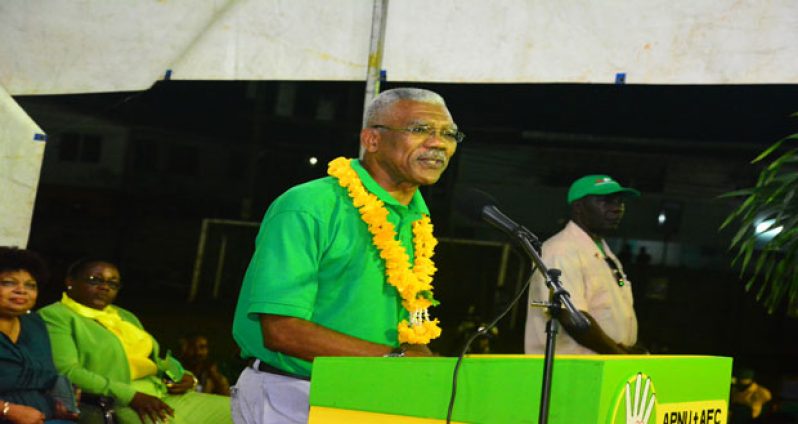ADDRESSING a crowd of just over 4000 persons last Sunday evening at the APNU+AFC Unity Rally held in Bartica, that party’s Presidential Candidate, David Granger, unleashed his political spirit and made several big promises to Barticians.Among these were major development of the education sector; infrastructural development; and security enhancement, should his government be elected to govern following General and Regional Elections on May 11.
A historian as well, Granger said the 170-year-old settlement of Bartica would be “revived” come May 11, when the APNU+AFC coalition secures a victory at the elections. Should this become a reality, Granger noted, the day following Guyana’s 50th Independence anniversary, May 27 2016, would be the day when the APNU+AFC government declares Bartica a town.
This promise was certainly well received by the crowd, which responded with thunderous applause.
Granger then related that his next plan is to ensure that Bartica becomes a more secure town, but he said that would require an overhauling of the security sector in the region. His plan, he stressed, is to first ensure that the Police Divisional Commander is stationed in the community, rather than working from Georgetown.
“The Commander of F Division will live in Bartica, not at Eve Leary. He cannot run Bartica from Orange Walk,” a fired up Granger declared.
He also proposed that, under the APNU+AFC government, the police would be better paid and equipped, since that government would invest in resources which are deemed needed by the police.
Stepping it up a notch to an evidently hyped crowd, the APNU+AFC leader then made the biggest promise of the night, which was that Barticians could expect the Potaro Road to be transformed into a highway, should his government secure a victory.
Infrastructural development, he noted, is key to development in any region; and for this reason, he explained, infrastructural development was needed in Region Seven.
A technical institute for the region and major developmental plans for the education sector were also announced as being on the agenda for the coalition.
“Bartica,” he said, “is the gateway to good jobs”, and if Barticians want to develop the region rapidly, investment in the education system should be placed on the front burner.
But despite these claims and promises of what would be done for the region, the leader failed to mention whether a feasibility study had been done by the coalition, given that it has signalled its intention to massively overhaul the tax regime while at the same time increasing social security’s Old Age pension and public servants’ salaries.
Prior to the rally on Sunday, the coalition had promised to increase Old Age pensions to Gy$15,000 initially, and give a 20 percent across-the-board salary increase to law enforcement personnel and a 10 percent salary hike to other government employees.
A coalition-led administration also plans to give a Gy$50,000 monthly allowance to each of 200 youths to help them pursue their goals in athletics, arts and music.
As it relates to the tax reform intention of the coalition, Granger had this to tell a sitting audience of a few hundred at a forum arranged by the Guyana Women’s Roundtable (GWR) and Guyana National Youth Council (GNYC): “This is something we have examined before…we have made proposals for the reduction of the VAT, which has not been approved…and proposals for raising the tax threshold.”
He had further explained that a Tax Reform Commission would be set up with the general intent of raising the tax threshold; reducing Pay As You Earn (PAYE) tax; and reducing Value Added Tax (VAT), which currently sits at 16%.
In a supposedly ‘leaked’ version of the coalition’s manifesto, it was revealed that the APNU+AFC had documented the personal income tax threshold to be raised to $100,000.
A hopeful Granger had also alluded to the coalition’s intention to reduce the customs duties that are being paid daily to import vehicles, and had pointed to the removal of any form of taxation on the basic necessities that a household would require for survival on a daily basis.
But despite these promises, the “glory story” of the APNU+AFC, as political pundits so described it, is still to be supported by a feasibility study, which provides a basis to prove that these “promises” are practicable and the major reduction in taxes can sustain the economy.



.jpg)








